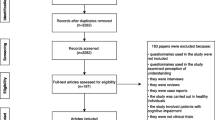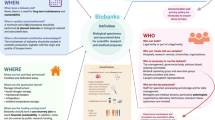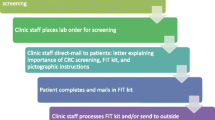Abstract
Despite ongoing research efforts to reclassify BRCA variant of uncertain significance (VUS), results for strategies to disseminate findings to genetic counselors are lacking. We disseminated results from a study on reclassification of BRCA VUS using a mailed reclassification packet including a reclassification guide, patient education aid, and patient letter template for patients/families with BRCA VUS. This study reports on genetic counselors’ responses to the dissemination materials. Eligible participants (n = 1015) were identified using mailing lists from professional genetics organizations. Participants were mailed a BRCA VUS reclassification packet and a return postcard to assess responses to the materials. Closed-ended responses were analyzed using descriptive statistics, and thematic analysis was conducted on open-ended responses. In response to the mailing, 128 (13.0%) genetic counselors completed and returned postcards. The majority of respondents (n = 117; 91.4%) requested the patient letter template and patient education guides as PDFs (n = 122; 95.3%). The majority (n = 123; 96.9%) wanted an updated reclassification guide upon availability. Open-ended responses demonstrate the material was well-received; some specified they would tailor the patient letter to fit their practice and patients’ needs. Participants requested additional patient and provider educational materials for use in practice. Materials communicating BRCA VUS reclassification updates were liked and were likely to be used in practice. To achieve the benefits of VUS reclassification in clinical practice, ongoing efforts are needed to continuously and effectively disseminate findings to providers and patients.
Similar content being viewed by others
References
Baker DL, Eash T, Schuette JL, Uhlmann WR (2002) Guidelines for writing letters to patients. J Genet Couns 11(5):399–418
Balmaña J, Digiovanni L, Gaddam P, Walsh MF, Joseph V, Stadler ZK et al (2016) Conflicting interpretation of genetic variants and cancer risk by commercial laboratories as assessed by the Prospective Registry of Multiplex Testing. J Clin Oncol 34:4071–4078
Braun V, Clarke V (2006) Using thematic analysis in psychology. Qual Res Psychol 3(2):77–101
Brown E, Skinner M, Ashley S, Reed K, Dixon SD (2016) Assessment of the readability of genetic counseling patient letters. J Genet Couns 25(3):454–460
Campeau PM, Foulkes WD, Tischkowitz MD (2008) Hereditary breast cancer: new genetic developments, new therapeutic avenues. Hum Genet 124(1):31–42
Cho YI, Johnson TP, VanGeest JB (2013) Enhancing surveys of health care professionals: a meta-analysis of techniques to improve response. Eval Health Prof 36(3):382–407
Cragun D, Radford C, Dolinsky J, Caldwell M, Chao E, Pal T (2014) Panel-based testing for inherited colorectal cancer: a descriptive study of clinical testing performed by a US laboratory. Clin Genet 86(6):510–520
Dillman DA (2000) Mail and internet surveys: the tailored design method (vol. 2). Wiley, New York
Domchek SM, Friebel TM, Singer CF, Evans DG, Lynch HT, Isaacs C et al (2010) Association of risk-reducing surgery in BRCA1 or BRCA2 mutation carriers with cancer risk and mortality. JAMA 304(9):967–975
Eccles B, Copson E, Maishman T, Abraham J, Eccles D (2015a) Understanding of BRCA VUS genetic results by breast cancer specialists. BMC Cancer 15(1):1
Eccles DM, Mitchell G, Monteiro ANA, Schmutzler R, Couch FJ, Spurdle AB, Gómez-García EB, on behalf of the ENIGMA Clinical Working Group, Driessen R, Lindor NM, Blok MJ, Moller P, de la Hoya M, Pal T, Domchek S, Nathanson K, Van Asperen C, Diez O, Rheim K, Stoppa-Lyonnet D, Parsons M, Goldgar D (2015b) BRCA1 and BRCA2 genetic testing—pitfalls and recommendations for managing variants of uncertain clinical significance. Ann Oncol 26(10):2057–2065. https://doi.org/10.1093/annonc/mdv278
Forrest LE, Delatycki MB, Curnow L, Skene L, Aitken M (2010) Genetic health professionals and the communication of genetic information in families: practice during and after a genetic consultation. Am J Med Genet A 152(6):1458–1466
Gage M, Wattendorf D, Henry L (2012) Translational advances regarding hereditary breast cancer syndromes. J Surg Oncol 105(5):444–451
Grann VR, Patel PR, Jacobson JS, Warner E, Heitjan DF, Ashby-Thompson M et al (2011) Comparative effectiveness of screening and prevention strategies among BRCA1/2-affected mutation carriers. Breast Cancer Res Treat 125(3):837–847
Kindig DA, Panzer A, Nielsen-Bohlman L (2004) Health literacy: a prescription to end confusion. Institutes of Medicine, Washington, DC, p 309283329
Krippendorff K (2012) Content analysis: an introduction to its methodology. Sage, Thousand Oaks
Kurian AW, Hare EE, Mills MA, Kingham KE, McPherson L, Whittemore AS et al (2014) Clinical evaluation of a multiple-gene sequencing panel for hereditary cancer risk assessment. J Clin Oncol 32(19):2001–2009
Kutner M, Greenburg E, Jin Y, Paulsen C (2006) The health literacy of America’s adults: results from the 2003 National Assessment of Adult Literacy. NCES 2006-483. National Center for Education Statistics, p 76. https://eric.ed.gov/?id=ED493284
Lindor NM, Guidugli L, Wang X, Vallée MP, Monteiro AN, Tavtigian S et al (2012) A review of a multifactorial probability-based model for classification of BRCA1 and BRCA2 variants of uncertain significance (VUS). Hum Mutat 33(1):8–21
Lindor NM, Goldgar DE, Tavtigian SV, Plon SE, Couch FJ (2013) BRCA1/2 sequence variants of uncertain significance: a primer for providers to assist in discussions and in medical management. Oncologist 18(5):518–524
Maxwell KN, Wubbenhorst B, D’Andrea K, Garman B, Long JM, Powers J et al (2014) Prevalence of mutations in a panel of breast cancer susceptibility genes in BRCA1/2-negative patients with early-onset breast cancer. Genet Med 17(8):630–638
McMaster HS, LeardMann CA, Speigle S, Dillman DA (2017) An experimental comparison of web-push vs. paper-only survey procedures for conducting an in-depth health survey of military spouses. BMC Med Res Methodol 17(1):73
Mendes Á, Paneque M, Sousa L, Clarke A, Sequeiros J (2016) How communication of genetic information within the family is addressed in genetic counselling: a systematic review of research evidence. Eur J Hum Genet 24(3):315–325
Mesters I, Ausems A, De Vries H (2005) General public’s knowledge, interest and information needs related to genetic cancer: an exploratory study. Eur J Cancer Prev 14(1):69–75
Molster C, Charles T, Samanek A, O’Leary P (2008) Australian study on public knowledge of human genetics and health. Public Health Genomics 12(2):84–91
NSGC (2016) Survey report: 2016 NSGC professional status survey executive summary. National Society of Genetic Counselors. https://www.nsgc.org/p/cm/ld/fid=68
O’Neill SC, Rini C, Goldsmith RE, Valdimarsdottir H, Cohen LH, Schwartz MD (2009) Distress among women receiving uninformative BRCA1/2 results: 12-month outcomes. Psycho-Oncology 18(10):1088–1096
Pal T, Permuth-Wey J, Betts JA, Krischer JP, Fiorica J, Arango H et al (2005) BRCA1 and BRCA2 mutations account for a large proportion of ovarian carcinoma cases. Cancer 104(12):2807–2816
Pepin MG, Murray ML, Bailey S, Leistritz-Kessler D, Schwarze U, Byers PH (2015) The challenge of comprehensive and consistent sequence variant interpretation between clinical laboratories. Genet Med 18:20–24
Petrucelli N, Lazebnik N, Huelsman KM, Lazebnik RS (2002) Clinical interpretation and recommendations for patients with a variant of uncertain significance in BRCA1 or BRCA2: a survey of genetic counseling practice. Genet Test 6(2):107–113
Plon SE, Eccles DM, Easton D, Foulkes WD, Genuardi M, Greenblatt MS et al (2008) Sequence variant classification and reporting: recommendations for improving the interpretation of cancer susceptibility genetic test results. Hum Mutat 29(11):1282
Richards S, Aziz N, Bale S, Bick D, Das S, Gastier-Foster J et al (2015) Standards and guidelines for the interpretation of sequence variants: a joint consensus recommendation of the American College of Medical Genetics and Genomics and the Association for Molecular Pathology. Genet Med 17(5):405–423
Richter S, Haroun I, Graham T, Eisen A, Kiss A, Warner E (2013) Variants of unknown significance in BRCA testing: impact on risk perception, worry, prevention and counseling. Ann Oncol 24(suppl 8):viii69–viii74
Roggenbuck J, Temme R, Pond D, Baker J, Jarvis K, Liu M et al (2015) The long and short of genetic counseling summary letters: a case–control study. J Genet Couns 24(4):645–653
Sandberg EH, Sharma R, Sandberg WS (2012) Deficits in retention for verbally presented medical information. J Am Soc Anesthesiol 117(4):772–779
Scherr CL, Lindor NM, Malo T, Couch FJ, Vadaparampil S (2015a) Genetic counselors’ practices and confidence regarding variant of uncertain significance results and reclassification from BRCA testing. Clin Genet 88(6):523–529
Scherr CL, Lindor NM, Malo TL, Couch FJ, Vadaparampil ST (2015b) A preliminary investigation of genetic counselors’ information needs when receiving a variant of uncertain significance result: a mixed methods study. Genet Med 17:739–746
Treacy K, Elborn JS, Rendall J, Bradley JM (2008) Copying letters to patients with cystic fibrosis (CF): letter content and patient perceptions of benefit. J Cyst Fibros 7(6):511–514
Tung N, Battelli C, Allen B, Kaldate R, Bhatnagar S, Bowles K et al (2015) Frequency of mutations in individuals with breast cancer referred for BRCA1 and BRCA2 testing using next-generation sequencing with a 25-gene panel. Cancer 121(1):25–33
Vail PJ, Morris B, van Kan A, Burdett BC, Moyes K, Theisen A et al (2015) Comparison of locus-specific databases for BRCA1 and BRCA2 variants reveals disparity in variant classification within and among databases. J Community Genet 6(4):351–359
Vos J, Otten W, van Asperen C, Jansen A, Menko F, Tibben A (2008) The counsellees’ view of an unclassified variant in BRCA1/2: recall, interpretation, and impact on life. Psycho-Oncology 17(8):822–830
Vos J, Gómez-García E, Oosterwijk JC, Menko FH, Stoel RD, van Asperen CJ et al (2012) Opening the psychological black box in genetic counseling. The psychological impact of DNA testing is predicted by the counselees’ perception, the medical impact by the pathogenic or uninformative BRCA1/2-result. Psycho-Oncology 21(1):29–42
White P, Singleton A, Jones R (2004) Copying referral letters to patients: the views of patients, patient representatives and doctors. Patient Educ Couns 55(1):94–98
Funding
This work was supported by the Breast Cancer Spore CA 116201. This work was supported in part by the Survey Methods Core Facility at the H. Lee Moffitt Cancer Center & Research Institute; a National Cancer Institute designated Comprehensive Cancer Center (P30-CA76292).
Author information
Authors and Affiliations
Corresponding author
Ethics declarations
Conflict of interest
Authors Augusto, Lake, Scherr, Lindor, and Couch declare that they have no conflict of interest. Author Vadaparampil has a research grant from Myriad Genetics Laboratories.
Human studies and informed consent
All procedures followed were in accordance with the ethical standards of the responsible committee on human experimentation (institutional and national) and with the Helsinki Declaration of 1975, as revised in 2000 (5). Prior to conducting this study, approval was obtained from the University of South Florida and Mayo Clinic IRBs.
Rights and permissions
About this article
Cite this article
Augusto, B.M., Lake, P., Scherr, C.L. et al. From the laboratory to the clinic: sharing BRCA VUS reclassification tools with practicing genetics professionals. J Community Genet 9, 209–215 (2018). https://doi.org/10.1007/s12687-017-0343-3
Received:
Accepted:
Published:
Issue Date:
DOI: https://doi.org/10.1007/s12687-017-0343-3




